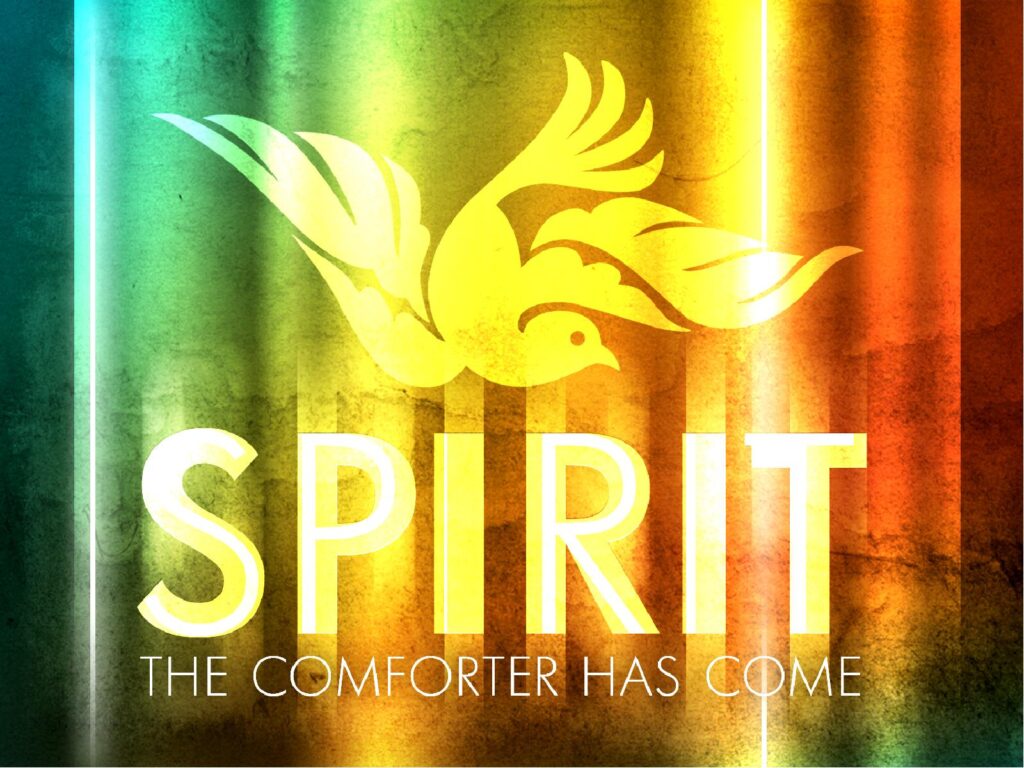
December 2021 Pastor’s Corner – Heavy Holidays

The disappointment, brokenness, suffering, and pain that characterize life in this present world is held in dynamic tension with the promise of future glory that is yet to come. In that Advent tension, the church lives its life. — Fleming Rutledge, Advent (pp. 7-8).
“Then I saw a new heaven and a new earth, for the first heaven and the first earth had passed away, and the sea was no more. And I saw the holy city, new Jerusalem, coming down out of heaven from God, prepared as a bride adorned for her husband. And I heard a loud voice from the throne saying, ‘Behold, the dwelling place of God is with man. He will dwell with them, and they will be his people, and God himself will be with them as their God. He will wipe away every tear from their eyes, and death shall be no more, neither shall there be mourning, nor crying, nor pain anymore, for the former things have passed away.’” (Rev. 21:1–4)
Rev.David Garrison
Read more...

October 2021 Pastor’s Corner – Taste And See

Oh, taste and see that the LORD is good!
Blessed is the man who takes refuge in him! — Psalm 34:8
Rev. David Garrison
Read more...

September 2021 Pastor’s Corner – 18 Months

It’s now been just about 18 months since this pandemic really started exploding across our country, and what a rollercoaster of an 18 months its been. There was the first few months of initial fear when everything shut down in March of 2020. But as we moved through the summer and the infection numbers in central Virginia stayed relatively low, we began to hope that things would return to normal by the fall, if not Christmas. With the return of school (although not “normal” school) in the fall, that hope continued to rise. But then as we moved into December and January, we saw a severe spike in infections in our area, and our hope began to fade. But then the vaccines became widely available, and numbers began to shrink again through the spring of 2021 – the end seemed to be in sight! Hope burned more brightly through this summer, as numbers in our area continued to decrease and plans to go back to “normal” school were put in place…but an anxiety lurked under the surface as news of highly contangious variants began to spread. And then school did begin, just last week (at the time I’m writing this). Now here we are today, on August 26, after only 6 schooldays, and all secondary schools in Amherst County are closed for a week and the Delta variant is running rampant in our area. Is this ever going to end? What do we do? How are we to hold on to hope in this midst of this rollercoaster of uncertainty?
Consider the wisdom of Psalm 40:
I waited patiently for the LORD;
he inclined to me and heard my cry.
He drew me up from the pit of destruction,
out of the miry bog,
and set my feet upon a rock,
making my steps secure.
He put a new song in my mouth,
a song of praise to our God.
Many will see and fear,
and put their trust in the LORD. (Psalm 40:1-3)
Whenever I read this Psalm, I always think of the picture of the lighthouse above. Look closely. Do you see the man standing in the doorway, completely at ease as these giant waves crash around him? He is still in the midst of the storm, but God has set him securely on the rock and protected him from harm. We would all prefer that God bring an end to this pandemic, and one day He surely will. In the meantime though, He invites us to trust Him even in the midst of the storm. Whether that storm is a pandemic, the loss of a job, a crisis of health, being persecuted for your faith, or any other number of things, the counsel is still the same. Trust in the Lord. He likely won’t remove the storm, but He will hold you safe and secure in the midst of the storm.
As we all become worn out and weary, tempted to lose hope that COVID will ever go away, hold fast to the Lord. Continue to cry out to Him and trust in Him. He might not remove the storm, but He will set your feet on the Rock of Jesus Christ and secure you. As you find His peace in the midst of the storm, may you find yourself singing a new song of praise to Him.
Blessings,
Rev. David Garrison
Read more...

August 2021 Pastor’s Corner – Does It Matter?

Jesus then took the loaves, and when he had given thanks, he distributed them to those who were seated. So also the fish, as much as they wanted. And when they had eaten their fill, he told his disciples, “Gather up the leftover fragments, that nothing may be lost.” So they gathered them up and filled twelve baskets with fragments from the five barley loaves left by those who had eaten. When the people saw the sign that he had done, they said, “This is indeed the Prophet who is to come into the world!” — John 6:11–14
He is the image of the invisible God, the firstborn of all creation. For by him all things were created, in heaven and on earth, visible and invisible, whether thrones or dominions or rulers or authorities—all things were created through him and for him. And he is before all things, and in him all things hold together. — Col. 1:15–17But in these last days he has spoken to us by his Son, whom he appointed the heir of all things, through whom also he created the world. He is the radiance of the glory of God and the exact imprint of his nature, and he upholds the universe by the word of his power. — Heb. 1:2–3
“Truly, truly, I say to you, it was not Moses who gave you the bread from heaven, but my Father gives you the true bread from heaven. For the bread of God is he who comes down from heaven and gives life to the world.” They said to him, “Sir, give us this bread always.” Jesus said to them, “I am the bread of life; whoever comes to me shall not hunger, and whoever believes in me shall never thirst.” — John 6:32–35
Rev. David Garrison
Read more...

July 2021 Pastor’s Corner – What If It’s Actually True?

Praise be to the God and Father of our Lord Jesus Christ, who has blessed us in the heavenly realms with every spiritual blessing in Christ. For he chose us in him before the creation of the world to be holy and blameless in his sight. In love he predestined us to be adopted as his sons through Jesus Christ, in accordance with his pleasure and will— to the praise of his glorious grace, which he has freely given us in the One he loves. In him we have redemption through his blood, the forgiveness of sins, in accordance with the riches of God’s grace that he lavished on us with all wisdom and understanding. —Ephesians 1:3–8
For this reason I kneel before the Father, from whom his whole family in heaven and on earth derives its name. I pray that out of his glorious riches he may strengthen you with power through his Spirit in your inner being, so that Christ may dwell in your hearts through faith. And I pray that you, being rooted and established in love, may have power, together with all the saints, to grasp how wide and long and high and deep is the love of Christ, and to know this love that surpasses knowledge—that you may be filled to the measure of all the fullness of God. — Ephesians 3:14–19
Rev. David Garrison
Read more...

June 2021 Pastor’s Corner – The Air We Breathe

Let us hold unswervingly to the hope we profess, for he who promised is faithful. And let us consider how we may spur one another on toward love and good deeds. Let us not give up meeting together, as some are in the habit of doing, but let us encourage one another—and all the more as you see the Day approaching. — Hebrews 10:23–25
Let everything that has breath praise the LORD! Praise the LORD! —Psalm 150:6
Rev. David Garrison
Read more...

May 2021 Pastor’s Corner – Conviction

“I tell you the truth: it is to your advantage that I go away, for if I do not go away, the Helper will not come to you. But if I go, I will send him to you. And when he comes, he will convict the world concerning sin and righteousness and judgment: concerning sin, because they do not believe in me; concerning righteousness, because I go to the Father, and you will see me no longer; concerning judgment, because the ruler of this world is judged.” (John 16:7–11)
I received some news this afternoon that absolutely threw me for a loop. The news itself wasn’t particularly bad or good, and really wasn’t even directly for or about me. And yet, it absolutely threw me off balance and left me in a place of profound introspection and self-examination. For whatever reason, it “laid bare my soul” and I found myself questioning much of what I thought I knew, believed and took for granted even just a few hours ago. What was it that caused me to react in such a way?
Conviction. Specifically the conviction of the Holy Spirit.
One of the reasons Jesus sent us the Holy Spirit is to convict us of our sin. Not in a “you’re a horrible, miserable person and I want you to feel guilt and shame” way, but rather a “sin keeps you from the fulness of life I bought for you on the cross, so let’s get rid of as much of it as we can” kind of way. We have an amazing ability to get comfortable with our misaligned priorities and values. Those priorities and values are probably not necessarily bad in and of themselves, but if they are more important to us than God and His Kingdom, then they are sinful and not righteous — it’s a subtle form of idolatry. It’s not necessarily that we have to get rid of those values and priorities, just that we need to put God’s values and priorities first. In the Sermon the Mount, Jesus said, “But seek first the kingdom of God and his righteousness, and all these things will be added to you.” (Matt. 6:33) I need to put God’s kingdom first, and trust Him to provide the rest.
The Holy Spirit used the news I received to shine a light on a couple of areas in my life where the kingdom of David was more important than the Kingdom of God. I’ll be honest, it wasn’t fun, and I spent quite a while doing some phenomenal self-rationalization and self-justification with God. And, honestly, I’m still working through it. I don’t like being told I’m wrong or in error, and I’m sure you don’t either. But I also know that God is shining the light in these areas of my heart because He loves me and wants His best for me. The same is true for you.
One of the key aspects of growing in holiness and faithfulness is keeping a soft heart that is sensitive to when the Holy Spirit is at work in us, convicting us of the areas in our lives that aren’t aligned with God’s heart and vision. As we celebrate the coming of the Holy Spirit on Pentecost this month, I pray that each of us would have tender hearts, shaped and formed by the Spirit of God in the image of the Son of God.
“…he disciplines us for our good, that we may share his holiness. For the moment all discipline seems painful rather than pleasant, but later it yields the peaceful fruit of righteousness to those who have been trained by it.” (Heb. 12:10–11)
Blessings,
Rev. David Garrison
Read more...

March 2021 Pastor’s Corner – Casting Your Cares

Cast your cares on the LORD and He will sustain you;
He will never let the righteous be shaken. — Psalm 55:22Cast all your anxiety on him because he cares for you. — 1 Peter 5:7
How are you doing, really? By the time this month ends, we’ll have lived in this pandemic with the ensuing quarantine and social distancing for an entire year. While some are anticipating that we’ll reach “herd immunity” by April, President Biden is suggesting that we shouldn’t expect a return to “normal” until Christmas. I think we’re all feeling the weight and strain in a heavier, more difficult way right now. It’s the weariness of being under stress and anxiety for a far longer period of time than our minds, our bodies and our emotions were meant to endure. And, of course, on top of the pandemic sits all of the pain and hurts that simply come with being human and being alive — pains and hurts that can be difficult enough to bear when we aren’t in a pandemic, but become nearly impossible to bear due to the pandemic. What are you doing with your hurts and pains (emotional and physical), the anxieties and fears, the weights and burdens of living in these hard times?
As the verses above remind and encourage us, God wants us to bring all of our cares and anxieties to him. But just what does that look like? I’m sure most of us have, at some point in time, cried out to the Lord and verbally thrown everything at him at once. That can be therapeutic — much like the whistle of a teapot lets off the pressure of the boiling water — and if you haven’t unburdened your soul that way in a long time, I absolutely encourage you to do so. But, if you have done that, you’ve probably found the same thing I have: while the immediate pressure release is helpful, the burdens and weights are still there. I’d like to invite you to try an ancient spiritual practice that helps us to hand our cares to the Lord in a more intentional way, a way that invites the Holy Spirit to sustain us more deeply.
The Daily Replay
The process is called The Daily Examen and was developed by St. Ignatius centuries ago. It is a 5-step process of prayerfully reviewing your day and anticipating the day to come. While meant to be practiced each day, it can be prayed at any point during the day. How long you take to work through the prayer is up to you — it could be as short as 5 minutes or as long as you need. Here’s an overview of what the process looks like:
1. Become aware of God’s presence.
Take several moments to breathe, relax, and invite God to be present with you.
Sometimes settling our body and mind is really difficult, especially when we have a lot going on.
One trick is to focus on our breathing. When we breathe slow and deep, we let our body and souls know that it is okay to relax and rest in God’s presence. Slowly take three seconds to breathe in through your nose, making sure to fill your belly with air . . . and then take three seconds to breathe out slowly through your mouth. Pause, then breathe in again. Repeat that a few times.
As you continue to breathe deeply and slowly, acknowledge God’s presence with each breath.
(Pause for a few moments)
2. Review the day with gratitude.
Look back through your day as if you were watching scenes from a movie. What happened? What were you like? What were others doing around you?
What are the good things that have happened today? What can you give thanks for?
(Pause for a few moments)
3. Pay attention to your emotions.
Ask yourself about how you felt at different points during the day.
What moments throughout your day have been difficult or tense?
When did you feel happy, excited, or at peace?
(Pause for a few moments)
4. Forgive, and ask for forgiveness.
Who are you angry or frustrated at?
Are there things you can forgive and let go in order to have peace?
What would you like to be forgiven for?
(Pause for a few moments)
5. Look toward tomorrow.
How might tomorrow be different?
What would you like to ask God to help with?
(Pause for a few moments)
Take some time to wrap up your conversation with God silently.
This kind of contemplative prayer can seem strange at first, but once we settle into the rhythm of it, I think you’ll find your awareness of the presence of God is growing stronger. Instead of just throwing our cares at God, through this process we more intentionally place them in God’s hands. Here are a few online resources to help you with The Daily Examen:
- A video walk-through of the prayer: https://fullerstudio.fuller.edu/prayer-of-examen/
- Using The Examen with teens and children (the above walkthrough is from this site): https://fulleryouthinstitute.org/blog/teaching-young-people-a-daily-way-to-pray
- A deeper look at The Examen: https://www.ignatianspirituality.com/ignatian-prayer/the-examen/
Blessings,
Rev. David Garrison
Read more...

Ash Wednesday – Out of Dust

Read more...

December 2020 Pastor’s Corner – The Importance of Advent

“The special note of Advent is its primary focus on the second coming of Christ, who will arrive in glory on the last day to consummate the kingdom of God — its orientation toward the promised future. Advent…differs from the other seasons in that it looks beyond history altogether and awaits Jesus Christ’s coming again “in glory to judge the living and the dead.” — Fleming Rutledge, Advent: The Once and Future Coming of Jesus Christ
This past Sunday, November 29, was the First Sunday in Advent. It marks the beginning of the Christian year. For most of us, Advent is the season preparing us for Christmas, as if it were simply the pre-Christmas season… after all, it does end on Christmas Eve. But Advent isn’t pointing to Christmas at all, it points far past Christmas. As the quote from Fleming Rutledge above states, Advent points not to Christ’s first coming, but to his Second. While we tend to treat Advent as a “countdown to Christmas,” it’s actually far deeper and meaningful.
It seems that, each year, we are in a bigger and bigger rush to get to Christmas. Stores have been pushing the “unofficial” beginning of the Christmas season earlier and earlier, and this year has pushed it even further — I saw Christmas decorations in stores this year weeks before Halloween! It is a strange and confusing thing to see Halloween and Christmas decorations side-by-side. Jack Skellington would be furious! But I also get it — 2020 has been an amazingly difficult year (although not even close to the worst year ever. That honor goes to 536 AD. No, seriously. Look it up). After months and months of the pandemic and social distancing, a terribly contentious presidential election cycle, murder hornets, and record-breaking natural disasters, we’re all pretty desperate for a little light and a dash of Christmas cheer. While I’m personally a staunch “no Christmas music until after Thanksgiving” Scrooge, I won’t judge anyone who has already put up a Christmas tree, some decorations, or gone all-in on Christmas music.
But don’t rush past Advent in order to get to Christmas. While Advent has a particular emphasis on the Second Coming of Christ, it does so with its feet firmly grounded in the present reality. As Fleming Rutledge explains, “Advent contains within itself the crucial balance of the now and the not-yet that our faith requires. [T]his book will explore this theme in relation to the yearly frenzy of “holiday” time in which the commercial Christmas music insists that “it’s the most wonderful time of the year” and Starbucks invites everyone to “feel the merry.” The disappointment, brokenness, suffering, and pain that characterize life in this present world is held in dynamic tension with the promise of future glory that is yet to come. In that Advent tension, the church lives its life…The Advent season encourages us to resist denial and face our situation as it really is” (Advent pp. 7-8). The hope of Christ’s Second Coming, even the joy of celebrating his First coming at Christmas, is all the more bright and joyous because of the dark, brokenness of this present world, not in spite of it.
Advent is not for the faint of heart. But there is a gift waiting for you, if you are willing to slow down and find it. They say it’s always darkest just before the dawn…is it not the darkness of the night that causes us to appreciate the light all the more? Allow yourself to be present in the hardness and pain of 2020 and in Advent’s much-needed reminder that, one day, Jesus Christ will come back and make everything sad untrue and make everything broken whole. In doing so, we find that Christmas takes a place in our life and our hearts far more true than decorations, songs and presents.
“The light shines in the darkness, but the darkness has not understood it.” (John 1:5)
Blessings,
Rev. David Garrison
Read more...
